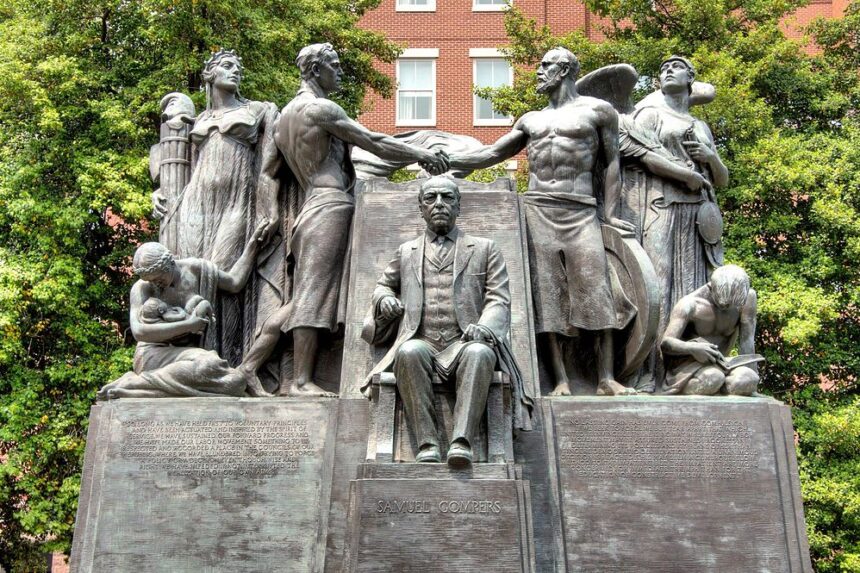As Labor Day, traditionally considered a left-wing holiday, is celebrated today in the United States and Canada, it’s worth considering how drastically what we call the “left” has changed from the political force that devised this holiday in the late 19th century. While ferociously fighting for equality among the working majority, much of the “Old Left” in the United States and Canada—meaning the pre-1960s left—considered traditional religion, family, and national pride as simply a part of existence and not to be challenged. The Old Left held social-democratic economic views but was also socially conservative. Much of the Old Left would have probably found the main concerns of the post-60s left as highly questionable, if not repugnant.
Present-day society’s ruling structures are best described in terms of a “managerial right” and a “therapeutic left,” as a number of social critics across the spectrum have argued. These critics include the editor of this magazine, U.S. paleoconservative theorist Paul Gottfried, as well as Frankfurt School-inspired philosopher Paul Piccone. Piccone’s interpretation of the Frankfurt School was rather unusual since he saw those figures as some of the most profound critics of the managerial-therapeutic regime—as opposed to the far more common view that the Frankfurt School had been instrumental in the institution of that regime.
According to Gottfried and Piccone, there currently exists a pseudo-opposition between the officially approved “right” and “left,” which—although riven in apparent conflict—in fact represent little more than a debate between managerial styles. The managerial right, typified by soulless multinational or transnational corporations (including the big banks and financial firms bailed out by over $1 trillion in U.S. taxpayer money), represents the consumerist, business, economic side of the system. The therapeutic left, typified by arrogant social engineers, represents redistribution of resources along politically correct lines, and “sensitivity training” for recalcitrants. Traditionalists and some eclectic left wingers oppose both the managerial right and the therapeutic left, which together constitute today’s new Establishment.
The left is also identified today, by some traditionalist and eclectic critics, such as Michael Medved (author of Hollywood vs. America) and Daniel Bell (author of The Cultural Contradictions of Capitalism), with the rougher edges of pop culture, which seek to negate traditional social norms. The profit motive of the corporations and the rebelliousness of the cultural left—and of late modern culture in general—feed off of each other, creating woke capitalism. Pop culture in America and Canada (including very reckless and irresponsible academic and art trends), and consumer culture are tightly intertwined. But the sense of an integrated self and society, in which people can hold a meaningful identity and engage in real public and political discourse, is fundamentally in atrophy.
The real class struggle today in both the U.S. and Canada, and everywhere in the West, is between the supporters and the critics of the managerial-therapeutic regime. The critics include genuine traditionalists—people who believe in traditional religion and morals, and who are able to perceive the assaults of both capitalists and therapeutic experts against those values—as well as communitarians, who emphasize “real communities” as against corporate and therapeutic manipulations.
The possibility of a coalition between the authentic right and left against the ersatz “right” and “left” Establishment agglomerate has been raised at earlier points in history. It is suggested in the words of John Ruskin, the 19th-century aesthetic and cultural critic. In an age of a pre-totalitarian and pre-politically correct left, he could confidently say, “I am a Tory of the sternest sort, a socialist, a communist.” G. K. Chesterton was also able to raise pointed questions against managerialist and consumerist capitalism, which, he astutely noted, was based on the premise of unending economic growth that would ultimately destroy nature and thoroughly undermine social mores and human dignity. He defended the broad, lower-middle and working classes, and called for more local and human-scale systems of economy.
On this Labor Day, it should be emphatically noted that the Old Left that devised this holiday and today’s traditionalist right hold far more in common than is typically supposed.
Image: Samuel Gompers Memorial (from: Bestbudbrian, CC BY-SA 4.0, via Wikimedia Commons)

Leave a Reply